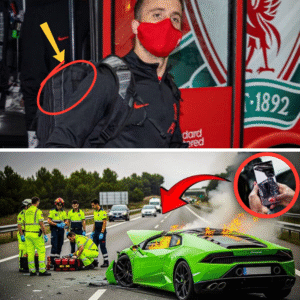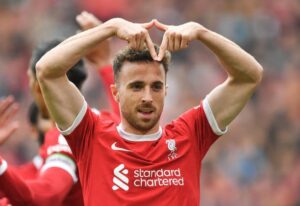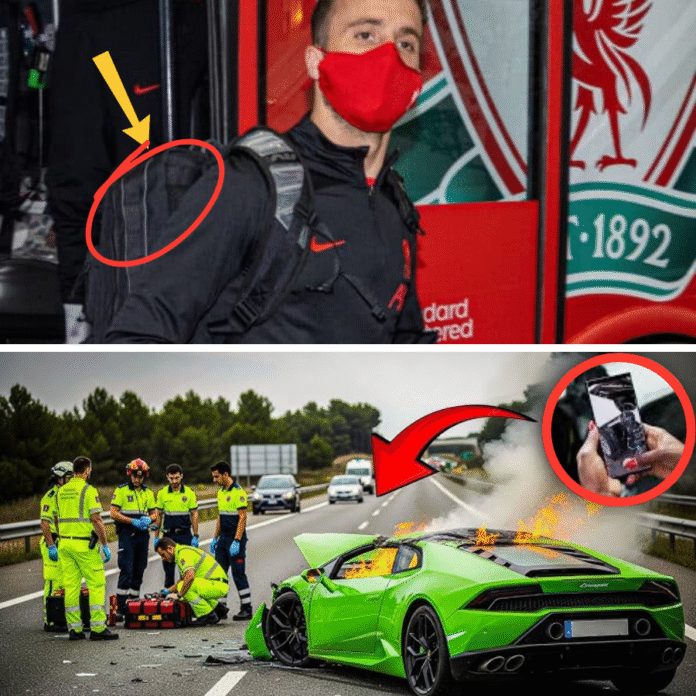BREAKING: Doctor Reveals the Tragic Truth About Diogo Jota’s Last Moments — and the 4 Words He Whispered Before Closing His Eyes Forever
On the morning of July 3, 2025, the football world was shaken by the devastating news of the death of Liverpool and Portugal star Diogo Jota, alongside his younger brother André Silva, in a tragic car accident in northwestern Spain. The 28-year-old forward, who had just celebrated his wedding to childhood sweetheart Rute Cardoso 11 days prior, was driving a Lamborghini Huracan when a tire blowout caused the vehicle to veer off the A-52 motorway near Zamora, bursting into flames. As the global football community mourns, new details have emerged from Jota’s medical team, including a heart-wrenching revelation from his respiratory physiotherapist, Miguel Goncalves, about the final moments and the four words Jota whispered before his untimely death: “I’m the lucky one.”

A Life Cut Short
Diogo Jota, known to Liverpool fans as “Jota the slotter” for his clinical finishing, was at the peak of his career. He had played a pivotal role in Liverpool’s Premier League triumph in the 2024-2025 season, scoring six goals and providing four assists in 26 appearances. His contributions extended beyond club football, as he helped Portugal secure the UEFA Nations League title in June 2025, a victory celebrated just weeks before his death. Off the pitch, Jota was a devoted family man, having married Rute Cardoso on June 22, 2025, in a joyful ceremony in Porto. The couple, who met in high school, shared three young children: sons Denis and Duarte, and a daughter born in 2024.
The accident occurred as Jota and his brother André, a 25-year-old professional footballer for Penafiel in Portugal’s second division, were traveling to Santander to catch a ferry to the UK. Jota had been advised against flying due to a recent lung surgery to address a pneumothorax, a collapsed lung condition he had bravely played through during Portugal’s Nations League campaign. The decision to drive, intended to safeguard his recovery, tragically led to the fatal crash.
The Doctor’s Revelation
Miguel Goncalves, Jota’s respiratory physiotherapist at Hospital São João in Porto, provided a poignant account of the footballer’s final hours. Goncalves, who had been overseeing Jota’s recovery, last saw him at 8:30 p.m. on July 2, just hours before the crash. He described Jota as “excited, confident in his recovery, and enthusiastic” for the upcoming Premier League season. The physiotherapist emphasized Jota’s professionalism, refuting rumors that the brothers had been partying. “To be clear, Diogo and André weren’t partying at all,” Goncalves stated, clarifying that the brothers were traveling at night because it was cooler and had planned to rest at a hotel in Burgos.
In a deeply emotional disclosure to Portuguese outlet Record, Goncalves shared the four words Jota whispered as they parted ways: “I’m the lucky one.” These words, echoing a comment Jota had left on his wife’s Instagram post days earlier, reflected his gratitude for his family, his recent marriage, and his successful career. The phrase, laden with love and optimism, now carries an unbearable weight for those left behind. Goncalves noted that Jota’s brother André had chosen to accompany him on the journey, a decision that allowed the siblings to spend their final hours together.
The Tragic Crash
According to Spain’s Guardia Civil, the accident occurred around 12:30 a.m. on July 3 on the A-52 motorway near Cernadilla, close to the Portuguese border. Initial investigations point to a tire blowout during an overtaking maneuver, causing the Lamborghini to leave the road and ignite. Spanish police later suggested that Jota, believed to be the driver, may have been speeding, with tire marks indicating excessive speed beyond the 120 km/h (75 mph) limit. However, two eyewitnesses, including a lorry driver who filmed the burning wreckage, have disputed these claims, arguing that road conditions may have contributed. The lorry driver, identified as Mr. Azevedo, attempted to assist with a fire extinguisher but was unable to save the brothers.

The crash site, marked by scorched vegetation and torn guardrails, became a somber testament to the tragedy. The brothers’ bodies were identified using documents and the car’s license plate, and their remains were repatriated to Portugal for the funeral. The investigation remains ongoing, with a final report expected to be submitted to a court in Puebla de Sanabria.
A Global Outpouring of Grief
The football world responded with an outpouring of tributes. Liverpool Football Club, devastated by the loss, issued a statement requesting privacy for Jota and André’s family, teammates, and staff. Flags at Anfield were lowered to half-mast, and fans created a shrine of scarves, flowers, and notes outside the stadium. Liverpool captain Virgil van Dijk and teammates, including Andrew Robertson and Alexis Mac Allister, attended the funeral in Gondomar on July 5, joined by former players like Jordan Henderson and Jürgen Klopp, who signed Jota in 2020.
Portugal captain Cristiano Ronaldo, a teammate in the national team, wrote on Instagram, “It doesn’t make sense. Just now we were together in the national team, just now you had got married.” FIFA President Gianni Infantino and Prince William also expressed their condolences, highlighting Jota’s impact on and off the pitch. Tributes extended beyond football, with Oasis dedicating a moment during their reunion tour in Cardiff to display Jota’s No. 20 jersey.
Jota’s Legacy
Jota’s journey from Porto’s youth leagues to global stardom was marked by resilience and talent. Beginning at Paços de Ferreira, he moved to Atlético Madrid, then Wolverhampton Wanderers, where he helped secure promotion to the Premier League. At Liverpool, he became a key figure under Klopp, scoring 65 goals and winning the Premier League, FA Cup, and two EFL Cups. His 49 caps for Portugal included two Nations League titles. Beyond football, Jota was a skilled esports player, reaching No. 1 on the FIFA Ultimate Team Champions leaderboard and owning LUNA Esports.
His personal life was equally fulfilling. Jota and Rute, who began dating in 2013, built a family rooted in love. Their wedding, described as “a day we will never forget,” was a celebration of their enduring bond. Rute, now a widow, faces the daunting task of raising their three children alone, supported by an estimated £35 million estate that ensures their financial security.
A Heartbreaking Farewell
The funeral at Igreja Matriz de Gondomar was a somber affair. Rute, dressed in white, helped carry her husband’s coffin, resting her head on it in a moment of profound grief. The Bishop of Porto, D. Manuel Linda, addressed the couple’s children, acknowledging the unimaginable pain faced by their mother and grandparents. As Schubert’s Ave Maria, played at their wedding, filled the church, mourners reflected on a life cut short but filled with joy and achievement.
Diogo Jota’s final words, “I’m the lucky one,” encapsulate a man who lived with gratitude and love. His legacy endures in his family, his teammates, and the fans who will forever chant his name at Anfield. As Liverpool manager Arne Slot said, “When the time is right, we will celebrate Diogo Jota, we will remember his goals and we will sing his song.” For now, the football world mourns a unique talent and an extraordinary person.



